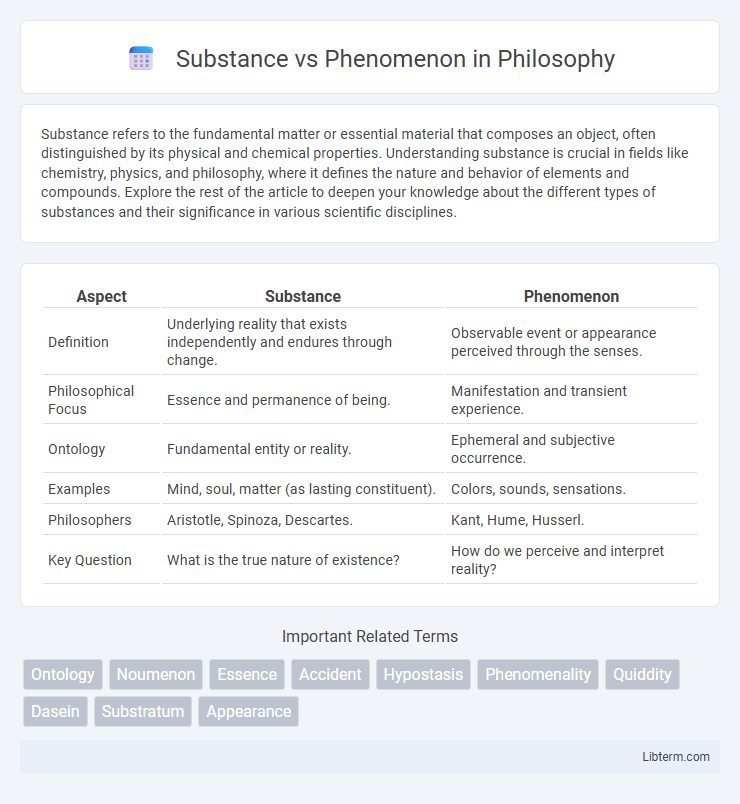Substance refers to the fundamental matter or essential material that composes an object, often distinguished by its physical and chemical properties. Understanding substance is crucial in fields like chemistry, physics, and philosophy, where it defines the nature and behavior of elements and compounds. Explore the rest of the article to deepen your knowledge about the different types of substances and their significance in various scientific disciplines.
Table of Comparison
| Aspect | Substance | Phenomenon |
|---|---|---|
| Definition | Underlying reality that exists independently and endures through change. | Observable event or appearance perceived through the senses. |
| Philosophical Focus | Essence and permanence of being. | Manifestation and transient experience. |
| Ontology | Fundamental entity or reality. | Ephemeral and subjective occurrence. |
| Examples | Mind, soul, matter (as lasting constituent). | Colors, sounds, sensations. |
| Philosophers | Aristotle, Spinoza, Descartes. | Kant, Hume, Husserl. |
| Key Question | What is the true nature of existence? | How do we perceive and interpret reality? |
Defining Substance: Core Concepts
Substance refers to the fundamental essence or underlying reality that exists independently and possesses intrinsic properties, distinguishing it from mere appearances or attributes. Core concepts of substance include its permanence, unity, and the capacity to support qualities without being defined by them. Philosophical discussions often explore substance as the substratum that underlies phenomena, serving as the bearer of properties and enabling continuity amid change.
What Constitutes a Phenomenon?
A phenomenon consists of observable events or occurrences that can be perceived through the senses or measured using instruments, distinct from the underlying substance or material causing them. It involves the manifestation of processes or interactions that reveal specific patterns, behaviors, or properties under certain conditions. The study of phenomena emphasizes empirical evidence and experiential data to understand how substances produce observable effects in various scientific disciplines.
Historical Perspectives on Substance and Phenomenon
Historical perspectives on substance and phenomenon trace back to classical philosophy, where substance was defined as the underlying reality or essence that exists independently, while phenomena represented the observable events or appearances dependent on perception. Aristotle emphasized substance as the primary reality supporting all properties, contrasting with phenomena as transient effects experienced through senses. During the Enlightenment, philosophers like Kant argued that phenomena are the only accessible reality shaped by human cognition, whereas substance, or noumenon, remains fundamentally unknowable.
Philosophical Frameworks: Substance vs. Phenomenon
Philosophical frameworks distinguish substance as an underlying, enduring entity that exists independently, while phenomena are the observable events or experiences dependent on perception. In metaphysics, substance represents the essential reality that persists through change, whereas phenomena constitute the transient appearances subject to sensory interpretation. This dichotomy shapes debates in ontology and epistemology, emphasizing the contrast between what is fundamentally real and what is merely perceived.
Substance in Science: Matter and Materiality
Substance in science refers to matter with a definite composition and distinct properties that make it identifiable and measurable, such as elements and compounds. It forms the foundation of materiality, defining physical reality through its structural and chemical characteristics. Understanding substance is crucial for analyzing the interactions, transformations, and conservation of matter within various scientific disciplines.
Phenomena in Natural and Social Sciences
Phenomena in natural sciences refer to observable events or processes such as gravity, photosynthesis, or chemical reactions, which are studied through empirical methods and experimentation. In social sciences, phenomena encompass human behaviors, social interactions, and cultural patterns like voting behavior, economic trends, or social movements, analyzed using qualitative and quantitative research techniques. Understanding phenomena allows scientists to identify patterns, establish theories, and predict future occurrences within both the physical world and human society.
Key Differences Between Substance and Phenomenon
Substance refers to the fundamental, unchanging material or essence that exists independently, while phenomenon denotes observable events or occurrences that arise from interactions or perceptions. Substances possess inherent properties and continue to exist regardless of observation, whereas phenomena are transient, dependent on sensory experience or specific conditions. Understanding this distinction clarifies how reality is categorized into what fundamentally exists versus what is experientially manifested.
Interrelations: How Substance and Phenomenon Influence Each Other
Substance forms the underlying reality that phenomena manifest from, providing the essential properties and structures that phenomena express. Phenomena reveal the observable aspects and dynamic behaviors of substance, offering experiential insights that can refine understanding of the substance itself. Their interrelation creates a continuous feedback loop where changes in phenomena can signify transformations or states within the underlying substance.
Real-World Examples: Substance and Phenomenon in Action
Substance refers to the underlying reality or material that constitutes objects, such as water as a substance composed of H2O molecules, while phenomenon describes observable events or experiences like the freezing of water into ice. In physics, gravity is a phenomenon resulting from the substance of spacetime curvature caused by mass. In biology, the substance of DNA governs the phenomenon of heredity, illustrating how material entities underpin observable effects.
Implications for Understanding Reality
Substance, as an enduring and self-sufficient entity, anchors reality in tangible, measurable existence, while phenomenon refers to observable events or appearances shaped by perception and context. This distinction impacts metaphysical debates by challenging whether reality is composed of independent substances or transient phenomena dependent on consciousness. Understanding reality thus involves balancing these concepts to explain both stable objects and dynamic experiences within philosophical and scientific frameworks.
Substance Infographic

 libterm.com
libterm.com